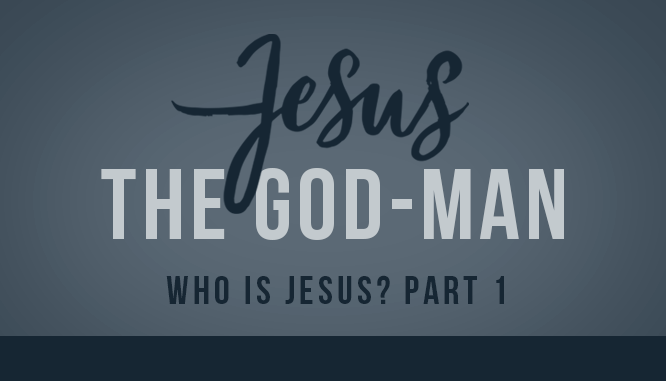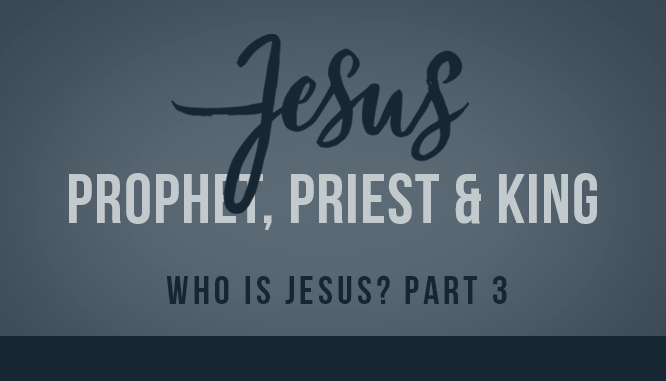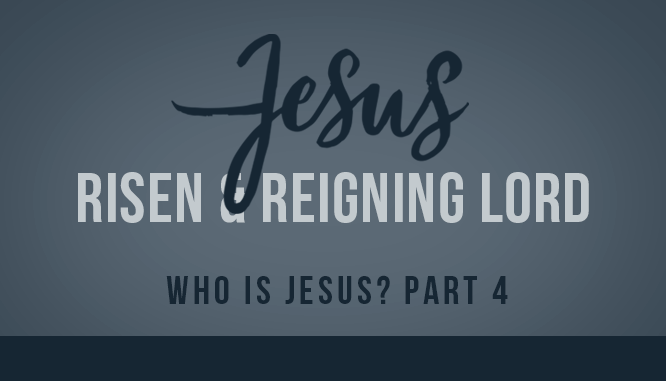Who is Jesus? The God-Man

Jesus Christ is the most famous historical figure in the world. He has been simultaneously admired, hated, obeyed, feared, loved, ignored, mocked, worshiped, and discussed by countless people throughout the ages. And while everyone has heard about Jesus, few today seem to know who He really is.
At the outset, it can be said without a doubt that Jesus is the Lord of lords and King of kings over the whole universe. Everything that has breath owes its very life to Him. This is absolutely true, and we heartedly affirm it. However, there is still much more to say when answering the question: Who is Jesus?
In the Bible, the author of Hebrews instructs us to diligently “consider Jesus” (Hebrews 3:1). This series is designed to do just that. We hope to walk you through some of the most central teachings of the Christian faith regarding Jesus.
Our aim in this first article is to give you some handles on understanding the Lord Jesus Christ as both God and man. Christians have grappled for centuries to comprehend the Biblical teaching that God became human, just like us, in the person of Jesus Christ without giving up any aspect of His divinity. Often called the “incarnation,” this teaching is beautiful and mysterious and should be contemplated rigorously for the rest of our lives. So, count this as merely the beginning of our considering Jesus.
Jesus is God.
When we say Jesus is God, this implies that we know a little bit about who God is. God is the creator and sustainer of all things, including you. This means Jesus is the creator and sustainer of all things, including you.
That might be slightly confusing, but Scripture teaches that “we worship one God in Trinity, and Trinity in Unity,” (Athanasian Creed). Or, put another way, our God is three persons in one essence. “For there is one person of the Father, another of the Son, and another of the Holy Spirit … yet they are not three eternals but one eternal” (Athanasian Creed).
Okay, this is more than slightly confusing, and much ink has been spilled on what is called the doctrine of the Trinity, i.e., God is three and one. For more detailed explanations on the meaning of the Trinity, check out this resource. But for our purposes, it is important to understand that Jesus is the second person of the Trinity—the Son—and truly God in His being.
Scripture also refers to Jesus as the Word of the Father, co-equal in wisdom and power, both unchanging and eternal. This Word is active in creation from beginning to end. As the Word, Jesus was not created by God because He is God. Through Him all things were made (John 1). He is timeless and above all things. Jesus Christ is “God from God, Light from Light, true God from true God, begotten, not made.” (Nicene Creed).
Jesus is human.
This second person of the Trinity, the Son, the eternal Word of the Father, entered time and became human (John 1:14). While still being God, He took on man’s nature as his own. We must be careful here. Jesus did not merely put on human flesh as some sort of space suit enabling Him to walk among other humans, while still being God. No! He was actually born of a woman (a virgin named Mary) by the power of the Holy Spirit. Jesus actually entered into the world in time as a human, just like any one of us.
This means that Jesus, being fully God, had a normal human body and human soul. He grew up like a normal boy (Luke 2:52). And he was able to feel normal human emotions, hunger pangs, and exhaustion (Matthew 8:23; Mark 11:12; John 11:35). Again, we must be careful. While having all the essential properties of a human and all the common weakness of any human, the Scriptures teach that Jesus was without sin.
Jesus is the God-man.
Jesus, then, has two natures, divine and human. He is the God-man. Each nature is full and complete. He is both fully God and fully man. However, each nature is distinct. His humanity is not part of his deity, and his deity is not part of his humanity. As we said earlier, the Trinity is three persons with one essence. Jesus, on the other hand, is one person with two essences.
The Westminster Confession is helpful here, it says, “So that two whole, perfect, and distinct natures, the Godhead and the manhood, were inseparably joined together in one person, without conversion, composition, or confusion. Which person is very God and very man, yet one Christ, the only Mediator between God and man,” (WCF 8.2).
His two natures exist in one person, so that God and man can be united. Theologians often call this the “hypostatic union.” This term sounds complicated, but it just means “personal union.” In the hypostatic union, divine and human natures are united in one person. Jesus really is God, and He really is man without diminishing any aspect of either nature. The man Jesus is God in the flesh. Jesus is God united with human nature.
You may think this is hard to understand. Indeed, Christians have been trying to figure out ways to rationalize this for ages. But Scripture tells us that this is the “great mystery of godliness,” that God was made manifest in the flesh (1 Timothy 3:16). Sometimes this means we must trust the Bible is true before we understand it. But there is also plenty of Reformed teaching on the incarnation to help you start wrapping your mind around it.
Why does this matter?
So, Jesus is the God-man? What does that even mean for us? Again, the Westminster Confession is helpful, “The Lord Jesus in His human nature thus united to the divine, to the end that being holy, harmless, undefiled, and full of grace and truth, He might be thoroughly furnished to execute the office of a mediator,” (WCF 8.3). The second person of the Trinity became Jesus the God-man for us. He did this not only to secure our salvation by dying in our place on the cross, but also to be a continual mediator between us and God.
It was important for Jesus to have both divine and human natures because only God can face the wrath of God and survive, and only a man could take the punishment for the sins of mankind. In Jesus, God unites Himself with humanity in the most intimate way possible. In Jesus, God has pledged himself to remain the God-man forever, as after His death and resurrection, Jesus as both God and man ascended to heaven and continually works for our salvation.
As one of the earliest Christian Theologians, Athanasius, wrote, “He became what we are that we might become what He is,” (The Incarnation of the Word by Athanasius). Saved by Jesus the God-man, we are cleansed from our sins and can be in relationship with the Triune God.
Philippians 2:5-8 says:
“Let this mind be in you, which was also in Christ Jesus: Who, being in the form of God, thought it not robbery to be equal with God: But made himself of no reputation, and took upon him the form of a servant, and was made in the likeness of men: And being found in fashion as a man, he humbled himself, and became obedient unto death, even the death of the cross.”
Jesus, as the second person of the Trinity, had everything and yet humbled himself. He humbled himself to share in our humanity, so that we may share in eternal life with Him. This makes the truth of the incarnation central to the Gospel message.
Conclusion
It should never stop overwhelming us that the Word was made flesh and dwelt among us for our sakes. The Word who could dissolve the world that sinned against Him in an instant instead was willing to become frail like one of us, to live like one of us, to die like one of us, so that we could live in Him. In the Nicene Creed, Christians around the world confess:
“For us men and for our salvation he came down from heaven, and by the Holy Spirit was incarnate of the Virgin Mary, and became man. For our sake he was crucified under Pontius Pilate, he suffered death and was buried, and rose again on the third day in accordance with the Scriptures. He ascended into heaven and is seated at the right hand of the Father. He will come again in glory to judge the living and the dead and his kingdom will have no end.”
For us, Jesus became the God-man. And for us he continues to be the God-man so that we may know God and live lives capable of goodness, righteousness, and truth. The truth of the incarnation demands all of us to bow before the God-man in humble worship and trust.


